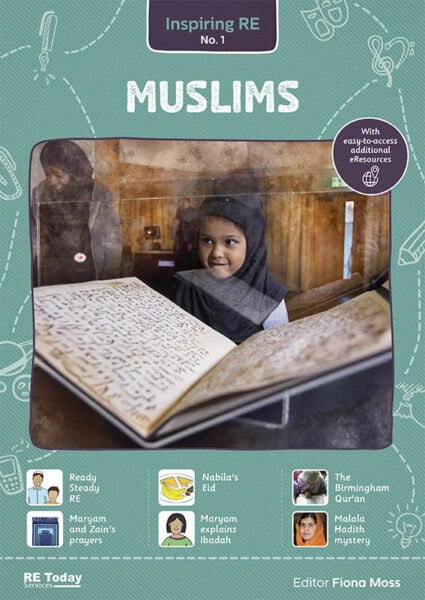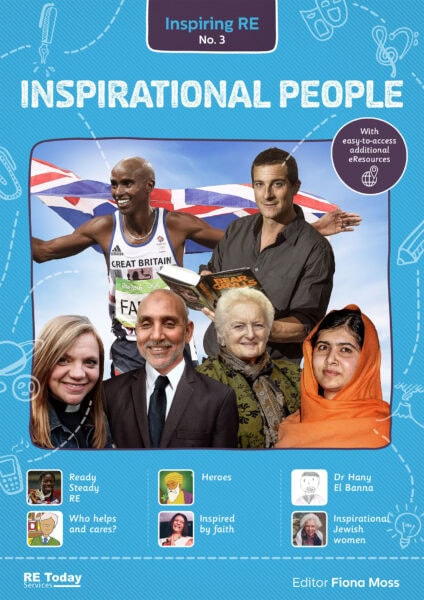
Big Questions
Humans have been asking ‘big’ questions for millennia: ‘How did the world come to be?’, ‘What happens after we die?’ and ‘Is there a meaning to life and, if so, what is it?’, to name just three. Many such questions are central to religions and worldviews, meaning that RE is a natural place to explore big questions and responses to them with pupils.
Primary-aged pupils can be encouraged to be excellent young philosophers: this book covers a number of topics from personal identity to the concept of peace, and provides strategies to embark on and develop philosophical enquiries, which are popular in many primary classrooms.
Activities within this book allow pupils aged from 4–11 to explore various big questions in a range of ways.
NATRE members have access additional e-resources.
Not a member? Find out how you can join.

Select a topic to explore resources
- ExternalToilet twinning
e-Resources
- Internal
Member Only Content
This content is available exclusively for members. Not yet registered? Sign up today.
- InternalAbigail-gets-Baptised.pdf
- Internal
 The Good Samaritan KS1 (home learning)A home learning resource on the Good Samaritan for KS1 students, focusing on kindness, compassion, and applying the lessons of love in daily life.
The Good Samaritan KS1 (home learning)A home learning resource on the Good Samaritan for KS1 students, focusing on kindness, compassion, and applying the lessons of love in daily life.
External Links
- ExternalHumanists UK website
- ExternalThe Planet in our Eyes (2004) by Andra-Alida Baban from the Global Art Project (for Activities 3 and 6)
- ExternalHow we should treat others - a film from RE Matters, Westhill and NASACRE on YouTube (Activity 5)
- ExternalThe Peace Book by Todd Parr (Little, Brown 2009) for Activity 3
eResources
- Internal
 Patchwork thinking gamePatchwork Thinking Game RE resource. A structured tool for promoting critical thinking about religious beliefs and worldviews.
Patchwork thinking gamePatchwork Thinking Game RE resource. A structured tool for promoting critical thinking about religious beliefs and worldviews.
Member Only Content
This content is available exclusively for members. Not yet registered? Sign up today.
- Internal
 Patchwork thinking game – teacher instructionsPatchwork Thinking Game Instructions RE resource. A structured guide for educators on facilitating interactive learning about religion.
Patchwork thinking game – teacher instructionsPatchwork Thinking Game Instructions RE resource. A structured guide for educators on facilitating interactive learning about religion. - Internal
 Peace quotation cardsPeace Quotation Cards RE resource. A structured tool for exploring religious and ethical teachings on peace through key quotations.
Peace quotation cardsPeace Quotation Cards RE resource. A structured tool for exploring religious and ethical teachings on peace through key quotations.
e-Resources
- InternalSTARS-framework.pdfoffering a structured approach to guide students through critical religious and philosophical questions with reflection and discussion.
Member Only Content
This content is available exclusively for members. Not yet registered? Sign up today.
- Internal
 Big Questions Unit 4: Philosophical thinkingencourages aging philosophical thinking in religious education, promoting engagement with fundamental questions.
Big Questions Unit 4: Philosophical thinkingencourages aging philosophical thinking in religious education, promoting engagement with fundamental questions.
External Links
- ExternalClip from BBC's My Life, My Religion: Hindus about the cycle of birth and rebirth
- ExternalCruse bereavement charity: resources for schools
e-Resources
- Internal
 Big Questions Unit 5: What do Hindus believe happens when you die?Exploration of Hindu beliefs about death and its spiritual significance.
Big Questions Unit 5: What do Hindus believe happens when you die?Exploration of Hindu beliefs about death and its spiritual significance.
Member Only Content
This content is available exclusively for members. Not yet registered? Sign up today.
- InternalWhat-do-young-British-Hindus-say-about-life-after-death.pdfexamining how views on God shape religious practices and worldviews.
- Internal
 Reflections on samsaraA primary RE resource on samsara, using questions and reflective activities to explore Hindu beliefs about life, death, and rebirth.
Reflections on samsaraA primary RE resource on samsara, using questions and reflective activities to explore Hindu beliefs about life, death, and rebirth. - Internal
 Hindu beliefs quizQuiz on Hindu beliefs for primary students learning about Hindu teachings.
Hindu beliefs quizQuiz on Hindu beliefs for primary students learning about Hindu teachings.
e-Resources
- Internal
 Alone at the beginning of time.Alone at the Beginning of Time: Explore philosophical reflections on creation and existence, with key religious texts and activities for deeper classroom discussions.
Alone at the beginning of time.Alone at the Beginning of Time: Explore philosophical reflections on creation and existence, with key religious texts and activities for deeper classroom discussions.
Select a topic to explore resources
External links
- ExternalToilet twinning
e-Resources
- Internal
Member Only Content
- Internal
- Internal
 The Good Samaritan KS1 (home learning)A home learning resource on the Good Samaritan for KS1 students, focusing on kindness, compassion, and applying the lessons of love in daily life.
The Good Samaritan KS1 (home learning)A home learning resource on the Good Samaritan for KS1 students, focusing on kindness, compassion, and applying the lessons of love in daily life.
External Links
- ExternalHumanists UK website
- ExternalThe Planet in our Eyes (2004) by Andra-Alida Baban from the Global Art Project (for Activities 3 and 6)
- ExternalHow we should treat others - a film from RE Matters, Westhill and NASACRE on YouTube (Activity 5)
- ExternalThe Peace Book by Todd Parr (Little, Brown 2009) for Activity 3
eResources
- Internal
 Patchwork thinking gamePatchwork Thinking Game RE resource. A structured tool for promoting critical thinking about religious beliefs and worldviews.
Patchwork thinking gamePatchwork Thinking Game RE resource. A structured tool for promoting critical thinking about religious beliefs and worldviews.
Member Only Content
- Internal
 Patchwork thinking game – teacher instructionsPatchwork Thinking Game Instructions RE resource. A structured guide for educators on facilitating interactive learning about religion.
Patchwork thinking game – teacher instructionsPatchwork Thinking Game Instructions RE resource. A structured guide for educators on facilitating interactive learning about religion. - Internal
 Peace quotation cardsPeace Quotation Cards RE resource. A structured tool for exploring religious and ethical teachings on peace through key quotations.
Peace quotation cardsPeace Quotation Cards RE resource. A structured tool for exploring religious and ethical teachings on peace through key quotations.
e-Resources
- InternalSTARS-framework.pdfoffering a structured approach to guide students through critical religious and philosophical questions with reflection and discussion.
Member Only Content
- Internal
 Big Questions Unit 4: Philosophical thinkingencourages aging philosophical thinking in religious education, promoting engagement with fundamental questions.
Big Questions Unit 4: Philosophical thinkingencourages aging philosophical thinking in religious education, promoting engagement with fundamental questions.
External Links
- ExternalClip from BBC's My Life, My Religion: Hindus about the cycle of birth and rebirth
- ExternalCruse bereavement charity: resources for schools
e-Resources
- Internal
 Big Questions Unit 5: What do Hindus believe happens when you die?Exploration of Hindu beliefs about death and its spiritual significance.
Big Questions Unit 5: What do Hindus believe happens when you die?Exploration of Hindu beliefs about death and its spiritual significance.
Member Only Content
- InternalWhat-do-young-British-Hindus-say-about-life-after-death.pdfexamining how views on God shape religious practices and worldviews.
- Internal
 Reflections on samsaraA primary RE resource on samsara, using questions and reflective activities to explore Hindu beliefs about life, death, and rebirth.
Reflections on samsaraA primary RE resource on samsara, using questions and reflective activities to explore Hindu beliefs about life, death, and rebirth. - Internal
 Hindu beliefs quizQuiz on Hindu beliefs for primary students learning about Hindu teachings.
Hindu beliefs quizQuiz on Hindu beliefs for primary students learning about Hindu teachings.
e-Resources
- Internal
 Alone at the beginning of time.Alone at the Beginning of Time: Explore philosophical reflections on creation and existence, with key religious texts and activities for deeper classroom discussions.
Alone at the beginning of time.Alone at the Beginning of Time: Explore philosophical reflections on creation and existence, with key religious texts and activities for deeper classroom discussions.








